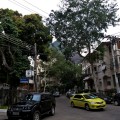Brazil Deforestation Highs And Lows
Sophie Trevitt | November 29, 2012.
Yesterday, the Brazilian Government announced that deforestation of the Amazon rainforest had hit a record low. Brazil has come a long way since deforestation peaked in 2004, at which time twenty percent of the Amazon rainforest had already been destroyed.
Environment Minister Izabella Teixeira announced that rates of deforestation have fallen by about three quarters since peaking in 2004, and have dropped an unprecedented 23 percent over the last annum. This is particularly significant in light of the climate change negotiations presently occurring in Doha, Qatar. It will represent an enormous reduction in Brazil’s land-use related carbon emissions which ranked Brazil as the world’s fourth largest carbon emitter in 2005.
The Brazilian Government attributes the steady decline in deforestation to improved surveillance technology and policing techniques to prevent illegal “slash-and-burn” activity. The Government has expressed concerns that it will continue to face challenges in preventing smaller-scale deforestation activity perpetrated by farmers and loggers who may not be detected by the satellite surveillance equipment.
Despite the obvious success of the new policing schemes; the effect is not uniform. Some Brazilian states, such as Tocantins, reported a rise in deforestation of up to 33 percent.
There is also a human story behind Brazil’s achievements. Landowners, farmers, miners and even local politicians all have vested interests in the clearing their land for personal and commercial purposes. The same rangers whose surveillance has been lauded by the Brazilian Government as contributing to the decline in deforestation, are often the target of these disgruntled interest groups. Retribution can be anything from death threats, to hostage attempts or vehicle damage. Conversely, farmers claim they must clear the land in order to grow food. As is the case with most stories of climate change, competing interests have concurrent claims to validity.
The Amazon is sometimes referred to as the “lungs of the planet” because of its highly significant ecological role in contributing approximately twenty percent of the earth’s oxygen to the atmosphere. Brazil is committed to reducing deforestation by 80% on 2005 levels by 2020 – efforts that will benefit the entire planet.
By Sophie Trevitt, photo by Greenpeace.











comment